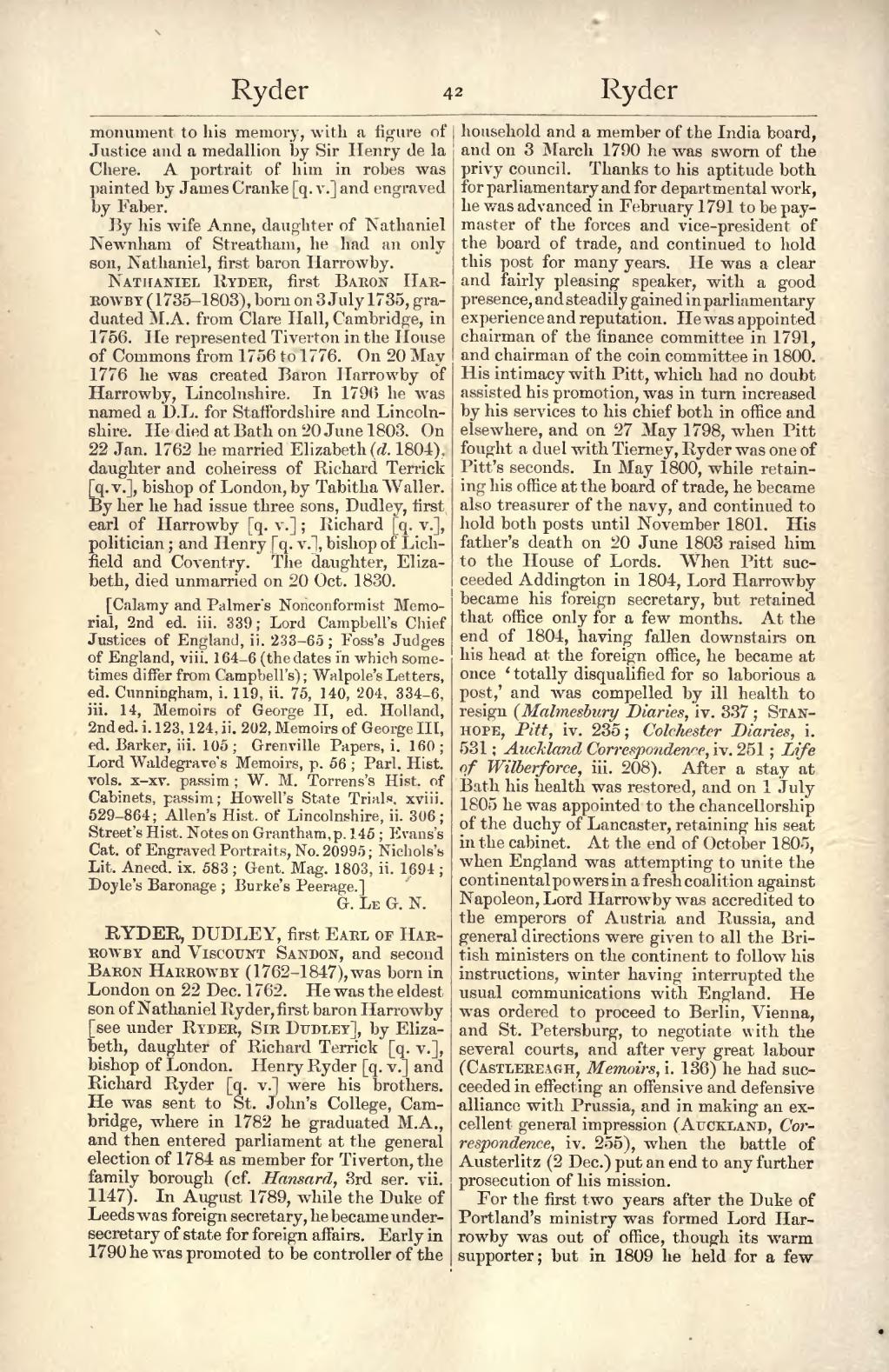monument to his memory, with a figure of Justice and a medallion by Sir Henry de la Chere. A portrait of him in robes was painted by James Cranke [q. v.] and engraved by Faber.
By his wife Anne, daughter of Nathaniel Newnham of Streatham, he had an only son, Nathaniel, first baron Harrowby.
Nathaniel Ryder, first Baron Harrowby (1735–1803), born on 3 July 1735, graduated M.A. from Clare Hall, Cambridge, in 1756. He represented Tiverton in the House of Commons from 1756 to 1776. On 20 May 1776 he was created Baron Harrowby of Harrowby, Lincolnshire. In 1796 he was named a D.L. for Staffordshire and Lincolnshire. He died at Bath on 20 June 1803. On 22 Jan. 1762 he married Elizabeth (d. 1804), daughter and coheiress of Richard Terrick [q. v.], bishop of London. By her he had issue three sons, Dudley, first earl of Harrowby [q. v.]; Richard [q. v.], politician; and Henry [q. v.], bishop of Lichfield and Coventry. The daughter, Elizabeth, died unmarried on 20 Oct. 1830.
[Calamy and Palmer's Nonconformist Memorial, 2nd ed. iii. 339; Lord Campbell's Chief Justices of England, ii. 233–65; Foss's Judges of England, viii. 164–6 (the dates in which sometimes differ from Campbell's); Walpole's Letters, ed. Cunningham, i. 119, ii. 75, 140, 204, 334–6, iii. 14, Memoirs of George II, ed. Holland, 2nd ed. i. 123, 124, ii. 202, Memoirs of George III, ed. Barker, iii. 105; Grenville Papers, i. 160; Lord Waldegrave's Memoirs, p. 56; Parl. Hist. vols. x–xv. passim; W. M. Torrens's Hist. of Cabinets, passim; Howell's State Trials, xviii. 529–864; Allen's Hist. of Lincolnshire, ii. 306; Street's Hist. Notes on Grantham, p. 145; Evans's Cat. of Engraved Portraits, No. 20995; Nichols's Lit. Anecd. ix. 583; Gent. Mag. 1803, ii. 1694; Doyle's Baronage, Burke's Peerage.]
RYDER, DUDLEY, first Earl of Harrowby and Viscount Sandon, and second Baron Harrowby (1762–1847), was born in London on 22 Dec. 1762. He was the eldest son of Nathaniel Ryder, first baron Harrowby [see under Ryder, Sir Dudley], by Elizabeth, daughter of Richard Terrick [q. v.], bishop of London. Henry Ryder [q. v.] and Richard Ryder [q. v.] were his brothers. He was sent to St. John's College, Cambridge, where in 1782 he graduated M.A., and then entered parliament at the general election of 1784 as member for Tiverton, the family borough (cf. Hansard, 3rd ser. vii. 1147). In August 1789, while the Duke of Leeds was foreign secretary, he became under-secretary of state for foreign affairs. Early in 1790 he was promoted to be controller of the household and a member of the India board, and on 3 March 1790 he was sworn of the privy council. Thanks to his aptitude both for parliamentary and for departmental work, he was advanced in February 1791 to be paymaster of the forces and vice-president of the board of trade, and continued to hold this post for many years. He was a clear and fairly pleasing speaker, with a good presence, and steadily gained in parliamentary experience and reputation. He was appointed chairman of the finance committee in 1791, and chairman of the coin committee in 1800. His intimacy with Pitt, which had no doubt assisted his promotion, was in turn increased by his services to his chief both in office and elsewhere, and on 27 May 1798, when Pitt fought a duel with Tierney, Ryder was one of Pitt's seconds. In May 1800, while retaining his office at the board of trade, he became also treasurer of the navy, and continued to hold both posts until November 1801. His father's death on 20 June 1803 raised him to the House of Lords. When Pitt succeeded Addington in 1804, Lord Harrowby became his foreign secretary, but retained that office only for a few months. At the end of 1804, having fallen downstairs on his head at the foreign office, he became at once ‘totally disqualified for so laborious a post,’ and was compelled by ill health to resign (Malmesbury Diaries, iv. 337; Stanhope, Pitt, iv. 235; Colchester Diaries, i. 531; Auckland Correspondence, iv. 251; Life of Wilberforce, iii. 208). After a stay at Bath his health was restored, and on 1 July 1805 he was appointed to the chancellorship of the duchy of Lancaster, retaining his seat in the cabinet. At the end of October 1805, when England was attempting to unite the continental powers in a fresh coalition against Napoleon, Lord Harrowby was accredited to the emperors of Austria and Russia, and general directions were given to all the British ministers on the continent to follow his instructions, winter having interrupted the usual communications with England. He was ordered to proceed to Berlin, Vienna, and St. Petersburg, to negotiate with the several courts, and after very great labour (Castlereagh, Memoirs, i. 136) he had succeeded in effecting an offensive and defensive alliance with Prussia, and in making an excellent general impression (Auckland, Correspondence, iv. 255), when the battle of Austerlitz (2 Dec.) put an end to any further prosecution of his mission.
For the first two years after the Duke of Portland's ministry was formed Lord Harrowby was out of office, though its warm supporter; but in 1809 he held for a few
